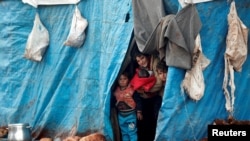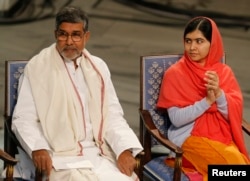Countries should spend more on schooling and less on weapons to ensure that children affected by war get an education, a child rights summit heard Monday.
The gathering in Jordan was told that a common thread of war was its devastating impact in keeping children out of school.
Indian Nobel laureate Kailash Satyarthi, who founded the summit, said ensuring all children around the world received a primary and secondary education would cost another $40 billion annually — about a week's worth of global military expenditure.
"We have to choose whether we have to produce guns and bullets, or we have to produce books and pencils to our children," he told the second Laureates and Leaders for Children Summit that gathers world leaders and Nobel laureates.
Global military expenditure reached almost $1.7 trillion in 2016, according to the Stockholm International Peace Research Institute. The United Nations children's agency UNICEF said last year 27 million children were out of school in conflict zones.
"We want safe schools, we want safe homes, we want safe countries, we want a safe world," said Satyarthi, who shared the 2014 Nobel Peace Prize with Pakistani schoolgirl Malala Yousafzai for his work with children.
Jordan's Prince Ali bin al-Hussein told the summit, which focused on child refugees and migrants affected by war and natural disasters, that education was "key," especially for "children on the move."
"Education can be expensive, but never remotely as close to what is being spent on weapons. ... They [children] are today's hope for a better future," he told the two-day summit.
Kerry Kennedy, president of Robert F. Kennedy Human Rights, a nonprofit group, described the number of Syrian refugees not in school in the Middle East as "shocking" as the war enters its eighth year.
Kennedy cited a report being released Tuesday by the KidsRights Foundation, an international children's rights group, which found 40 percent of school-aged Syrian children living in Turkey, Lebanon, Jordan, Egypt and Iraq cannot access education.






